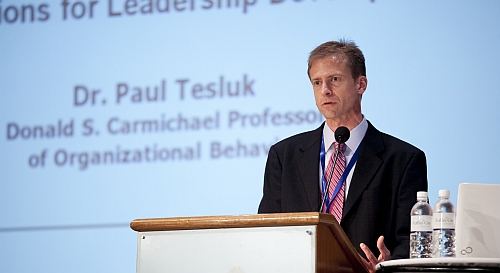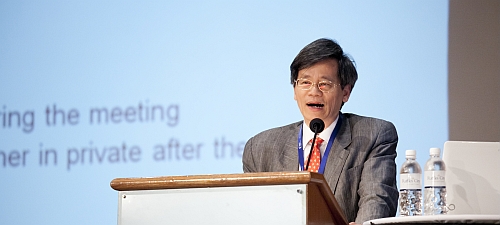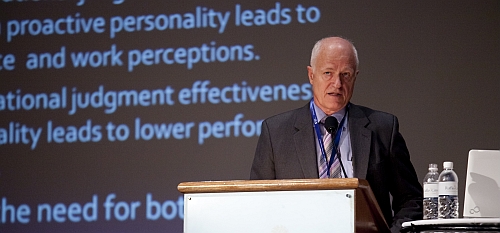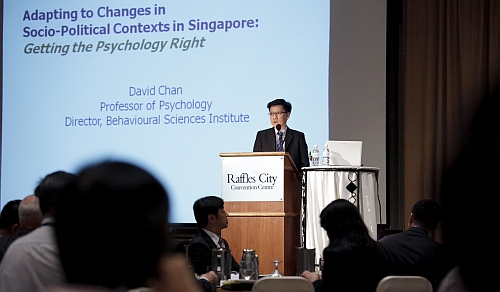The ability to adapt in an ever-changing environment is critical for success, if not, survival. Most people would acknowledge that change management can sometimes be a discomforting and bumpy process. This applies not just with individuals and organisations, but also with governments. While the former two may adapt privately, governments, represented by politicians and public officers, often have the unenviable task of demonstrating adaptability under the watchful eyes of their public. Slip-ups, trips and falls thus come at greater costs, which go well beyond mere embarrassment.
One might say that adaptability within the socio-political sphere has become far more critical today, given the ubiquity of the internet and social media. The ways in which leadership and engagement have evolved, between individuals and within organisations, have also altered people's expectations. People are used to flatter and more distributed structures today, noted Paul Tesluk, a professor of organisational behaviour at the University at Buffalo, at the Behavioural Sciences Institute (BSI) Conference 2012.
Tesluk argued that understandings of 'leadership' have to change from the traditional top-down structure to better respond within a more complex and dynamic environment, advancements in collaborative technologies, and to address preferences for a more inclusive and networked experience amongst the younger generations. Managing cultural diversity also becomes more critical, as more people work and live across cultural boundaries in a globalizing world, said Kwok Leung, a professor of management at the City University of Hong Kong, another speaker at the conference.
Commonsensical as it may seem, public leaders caught at the centre of a hyper-connected people with diverse views often express frustration and disillusionment with the experience. New York Mayor Michael R. Bloomberg had recently quipped, for instance, that social media has given rise to a form of leadership where "we are basically having a referendum on every single thing that we do every day." The statement is an exaggeration, of course, but it brings to the fore key tensions in adaptability, particularly within a rapidly changing environment.


A universal adapter
Adaptability is increasingly important today because of technological advancement, an increasingly diverse workforce, greater social mobility and economic shifts towards knowledge-based industries, said conference keynote speaker Neal Schmitt, Emeritus University Distinguished Professor of Psychology and Management at Michigan State University. He explained that adaptability has two key dimensions: a performance construct and a personal characteristic.
As a performance construct, adaptability refers to processes or behaviours with which an individual responds to the new problems created by change. As a personal characteristic, adaptability is about an individual's ability, skills and willingness to exert the necessary effort to change – which goes beyond just cognitive ability or academic intelligence.
Research has shown that adaptability can be measured reliably both as a personal characteristic and a performance construct; that it is possible to predict adaptive performance with reasonable validity; and that adaptability may be developed through experience in situations that demand adaptability. These are thus areas where research can inform practice, Schmitt noted.

Importantly, behavioural sciences research can inform the adaptive individual in a more impartial manner. "An evidence-based approach requires us to look at the situation and evidence as objectively as we can, within the constraints of the socio-political realities, and then to ask how we may understand and translate the evidence into decisions and actions," said BSI Director David Chan, a professor of psychology at Singapore Management University's School of Social Sciences.
Focusing his address on the contributions of behavioural sciences and psychology to adaptability in socio-political contexts, Chan mentioned that public leaders sometimes cite unique contextual and environmental differences as reasons to dismiss research. "Yes, it is important that we appreciate the uniqueness of each place and not blindly adopt practices from elsewhere, but it would be very strange if we are so unique that things that can apply everywhere else cannot apply here." After all, no organisation will say that they are so unique that they need not examine new and best practices of other organisations elsewhere, he quipped.
That said; he emphasised the importance of contextualising the issues; to "glo-calise" the science and practice so as to learn from findings with global relevance while taking into account local conditions and situations. This is where good translational research in psychology can be of great help – by offering different frames from which complex socio-political questions may be addressed. Using Singapore's immigration debate as an example, he noted that the discourse often revolves around numbers of foreigners and new citizens, and that the rationale often rests with keeping the economy stable – at a certain number.
"Numbers are important, of course, but the issue is not about absolute numbers… Rather, it is about the kinds of people that we bring in, the population profile that we would like to have as a country to enhance citizen well-being and national interests; the supporting infrastructure; in-group and out-group perceptions; the evolving population ranges for planning purposes, in response to dynamic changes, etc," he said. By taking into account the adaptive demands of macro contexts, psychology can offer both wider and deeper perspectives on socio-political challenges.
In Singapore, there have been, noticeably, greater calls for a more inclusive form of growth that goes beyond the Gross Domestic Product (GDP). The challenge, Chan said, is how to transition from a "GDP, money and economics" focus to one that views these material conditions as part of the means to achieve the more important ends such as "happiness, well-being and social compact".
This transition also calls for a change from a mechanical, rationalistic leadership to one that is sensitive to people’s emotions and non-material needs. But public leaders need to adapt to these changes carefully, Chan cautioned. While it is possible to switch from a task-oriented form of leadership to one that is more people-oriented and vice versa, "if you don't do it well and with coherent principles or if you're perceived to be less than genuine, switching from one to the other will not be viewed as 'adaptability'. It will be seen as hypocrisy."
Public leaders are also quite fond of framing socio-political issues as being torn between short-term needs versus long-term interests. This presents a false dichotomy, said Chan, because the two ideas are not categorically distinct, mutually exclusive, or diametrically opposed. The so-called short-term needs or concerns can directly influence long-term interests. Yet, the two are often presented as a forced-choice question: There is only one answer; one is right, and the other is wrong.
More basically, as a phrase, "long-term interests" is sometimes problematic for the fact that the future is uncertain and we do not always truly know where people’s "interests" might lie. "Interest" is also a value-laden word and a judgment, which can be sometimes right, sometimes wrong. It therefore makes more sense to speak of "longer-term issues" and the relationships linking "shorter-term concerns" and "longer-term issues", he said.
The difference between "interests" and "issues" is not a mere matter of semantics. It can have a bearing on adaptability. "You can tell me that this is for my long-term interest. If you are very sure and you turn out to be right, then it's fine. If you're not very sure or if you turn out to be wrong, then you lose your credibility," Chan explained.

Be a PAL
Chan suggested that public leaders need not always think and speak in terms of dichotomies and trade-offs. They should also consider and present the issues as points within a continuum, which may be more accurate, believable and palatable to a wider segment of the public.
"There is a re-focus of the nature of work of political leadership and the public service from being a multi-issue problem solver to what I call a Principled Adaptive Leader (PAL) – a term that I have been advocating to the public service for several years now," said Chan.
The term describes effective, intelligent leaders who are capable and willing to adapt to changes, and that can do so coherently, and in a principled way. Identifying and agreeing on the major principles, such as integrity, impartiality and fairness, is the easy part, he added. Adaptability, the harder part, requires an appreciation of context and of how people think, feel and act.
The PAL concept requires a better understanding of human rationality – and this goes beyond standard meanings of economic rationality. Chan explained that humans are rational insofar as we think and behave in ways that, we believe, will move us towards our desired goals. However, this is almost always not a calculative or mathematical form of rationality.
"It is important to understand the underlying psychological processes," Chan said, citing several examples to show how psychology can run counter to mathematical logic, yet explain and predict actual thoughts, emotions and behaviours. Perceptions of fairness, for instance: "Fairness is not about the fact that I have $7. It is about how I got $7 and how you got the amount that you received. It is rooted in social comparisons and processes leading to outcomes."
Past studies have also shown that fairness is asymmetrical: what some refer to as an "injustice reflex". People feel good when they perceive something to be fair, but that they feel much worse when they perceive something to be unfair. "The research is very clear. The intensity and effects of perceived unfairness are much stronger than that of perceived fairness," Chan noted.
All in all, adaptability goes beyond cognitive ability and academic intelligence. Good leaders will recognise that there are many ways in which the behavioural sciences can contribute to adaptability in organisations, government and society. Through translational research and an evidence-based approach towards the understanding and predicting how people think, feel and act, leaders will be better equipped to adapt effectively – especially within rapidly evolving socio-political contexts, Chan said. So we can dismiss, ignore or trivialise the adoption of scientific concepts and findings on human behaviours, but know that once trust and credibility is lost, it is very difficult to regain, if at all possible, he concluded.
